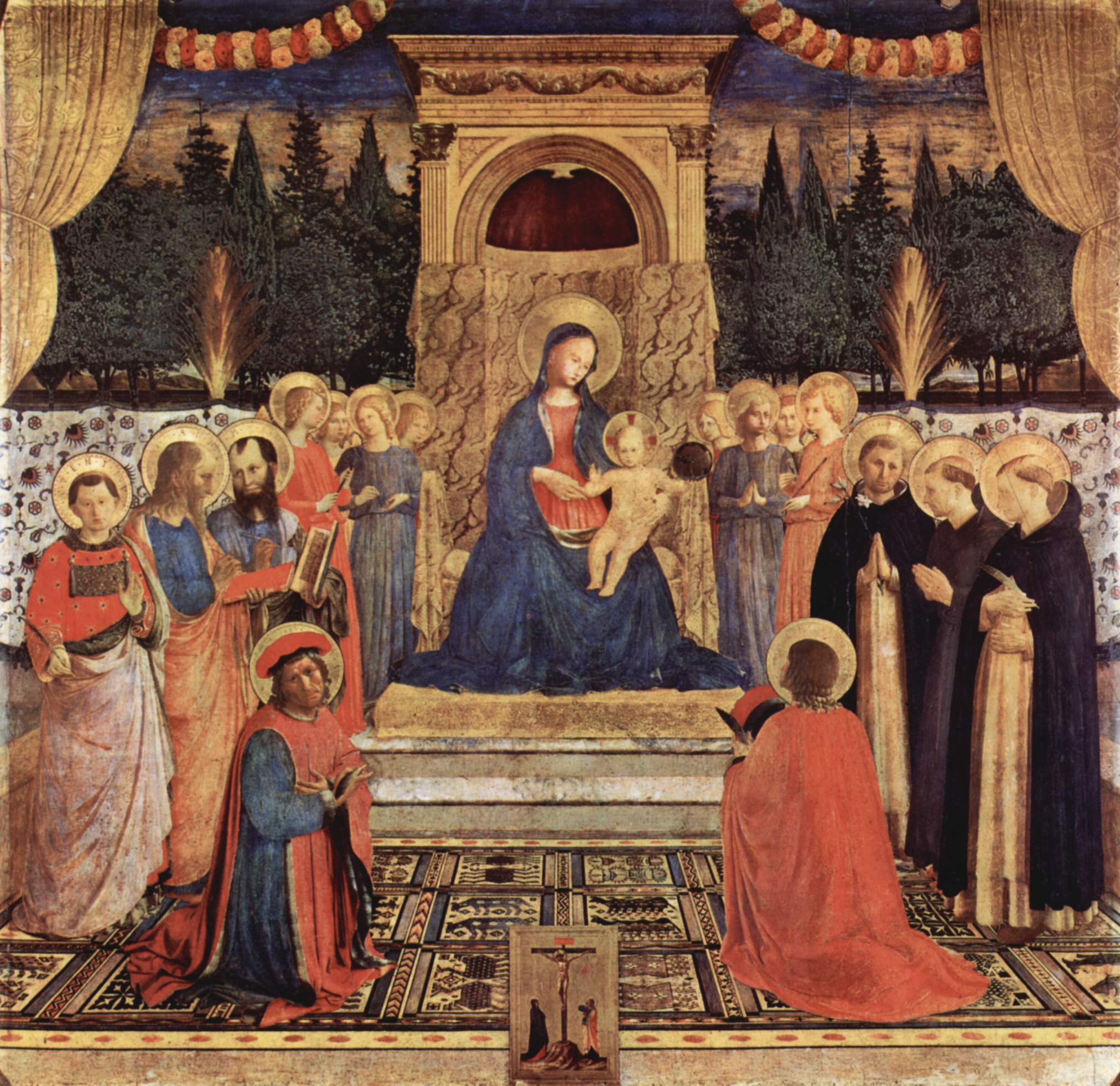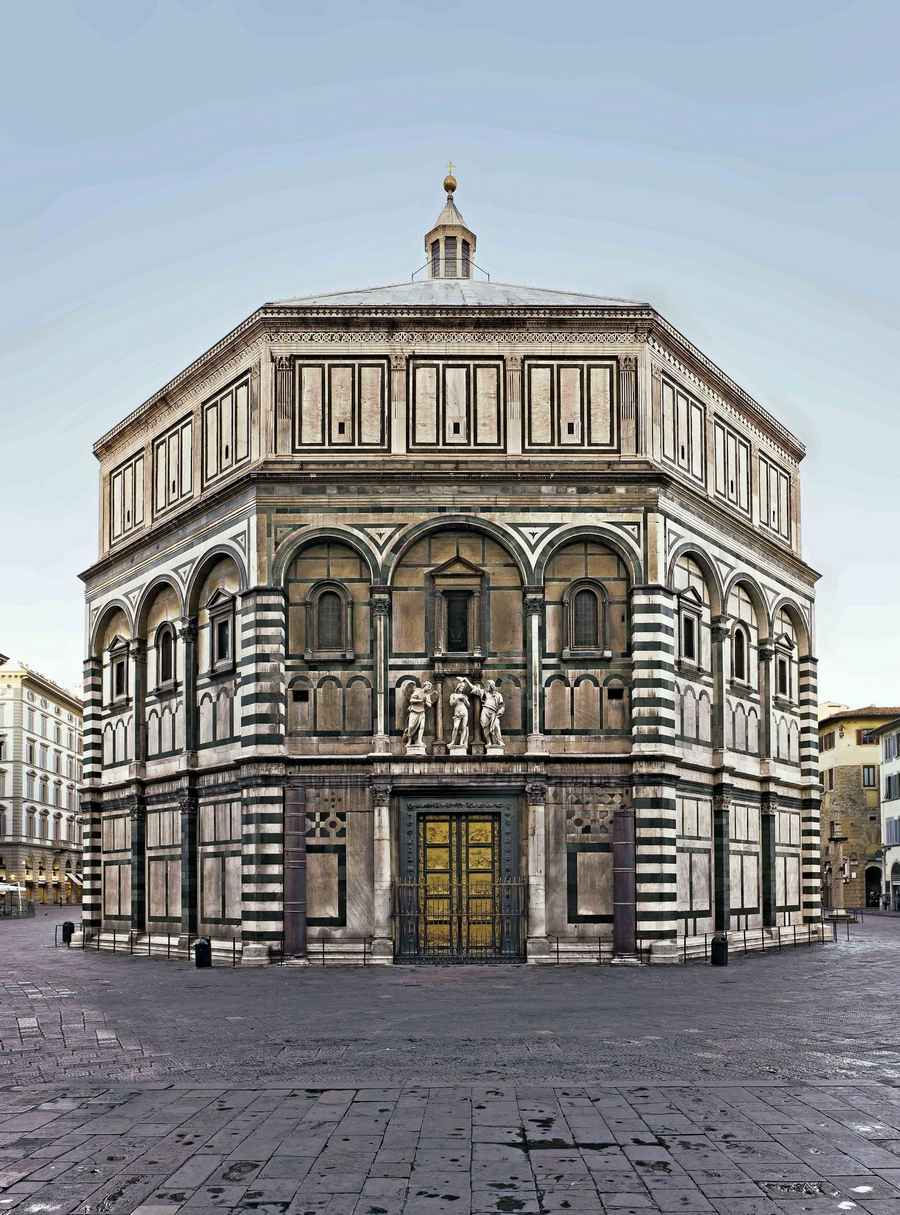The Stones of Venice--Part VII
Still discussing St Mark's Basilica: "From the vine-leaves of that archivolt, though there is no direct imitation of nature in them, but, on the contrary, a studious subjection to architectural purpose more particularly to be noticed hereafter, we may yet receive the same kind of pleasure which we have in seeing true vine-leaves and wreathed branches traced upon golden light; its stars upon their azure ground ought to make us remember, as its builder remembered, the stars that ascend and fall in the great arch of the sky; and I believe that stars, and boughs, and leaves, and bright colours are everlastingly lovely, and to be by all men beloved...I believe the man who designed and the man who delighted in that archivolt to have been wise, happy, and holy."
Whether this last is literally true as a general circumstance is not important. To see or to conceive of any aspect of human experience of life as possessing beauty, and by extension meaning, and to convey that conception to others through the peculiarly human arts--language, symbols, architecture, music, illustration, etc--is to have fulfilled the function of being human to the highest degree--and it is only in this that true wisdom, happiness and holiness lies, even if the wise man considers himself to be extremely wretched and stupid on account of more trivial matters.
Another central and intriguing idea of the book, which I have never seen dwelt on much elsewhere: "We attach, in modern days, a kind of sacredness to the pointed arch and the groined roof, because, while we look habitually out of square windows and live under flat ceilings, we meet with the more beautiful forms in the ruins of our abbeys. But when those abbeys were built, the pointed arch was used for every shop door, as well as for that of the cloister, and the feudal baron and freebooter feasted, as the monk sang, under vaulted roofs; not because the vaulting was thought especially appropriate to either the revel or psalm, but because it was then the form in which a strong roof was easiest built." Assuming this is true, and it does smack heavily of conjecture, it suggests many other questions, the most obvious of course being the eternal question of whether technology as we understand it, and certainly as we apply it, is crippling our ability to develop our humanity to this degree to which Ruskin refers. This question is almost always dealt with with us from the general material point of view, which no one in modern Western Civilization can really see around enough to divorce from anything else. Namely, we don't want to give up our comforts, our health system (which occupies the energies of what, 20% of the population now, and growing?) our ease, and even if we sense something of the sort to be the case in a vague way it is difficult to advance the argument publicly that these might be in any general way antithetic to realizing a more exalted state of humanity. That sort of intimacy with the sense of man's proper place in the universe (probably rather grim materially) and leading one's life somewhat in harmony with that which Ruskin appears to be championing, if it ever existed was based, I would imagine, on a fairly compact and readily interconnected unity of knowledge within both individuals and communities--the better one's mind, the further one could range, but he could not become untethered from the core unity from which all his understanding, and that of his fellows, emanated. This is something of the liberal arts ideal of course; it is not against the expansion of knowledge, but it emphasizes the importance of the unities being in place on which to graft that knowledge.
Fig 1: Fra Angelico--Adoration of St Dominic I guess we lost the picture.
"...because the Gothic and Byzantine styles are fit for churches, they are not therefore less fit for dwellings. They are in the highest sense fit and good for both, nor were they ever brought to perfection except where they were used for both."
"I cannot answer for the experience of others, but I never yet met with a Christian whose heart was thoroughly set upon the world to come, and, so far as human judgement could pronounce, perfect and right before God, who cared about art at all." This is an almost intuitive idea once you have some basic grasp of Christian theology, but the reality of maintaining such an attitude appears to be terrifying to more sophisticated people even if they are sympathetic to or even enthralled by some aspects of its possibilities (in Catholicism this terror apparently emanates from the very top). On a side note I have been finding many of the beautiful pictures for this series on websites and blogs dedicated pretty much exclusively to Catholic news and discussions of the myriad doctrines and services and robes and so forth of the Faith. I don't know who these people are, or where they get the time for their discourses, but they are certainly hardcore. I, by comparison, am not hardcore. I am self-indulgent. Which brings us nicely to...
Figure 2--The Baptistery, Parma I was never in Parma. It's looking pretty nice to me right now. A place like that, which is a city of considerable historical significance, but not particularly over-visited, I would not feel I was overstepping decency by poking around in a bit.
"Thus most Protestants, entering for the first time a Paradise of Angelico, would be irrevocably offended by finding that the first person the painter wished them to speak to was St. Dominic; and would retire from such a heaven as speedily as possible..." I evidently thought this was hilarious at the time.
Fig 3. The Dome of the Cathedral at Pisa I was never at Pisa either. It sounds like the sort of place I would have enjoyed; old, cheap, and home to a university (hence lots of bourgeois-intelligent people idling around in taverns and cinemas and that sort of thing). Obviously it is a mecca for kitsch tourism, but I really only mind that because I usually feel like I am near the top of everybody's list of candidates for who should be persuaded to stay home in the future travel utopia. I understand also that most visitors only stay in town for four hours or so and move on.

A long passage but one I want to take up a little: "For as religious faith renders emotion facile, so also it generally renders expression simple...a truly religious painter will very often be ruder, quainter, simpler, and more faulty in his manner of working, than a great irreligious one...It is impossible to calculate the enormous loss of power in modern days, owing to the imperative requirement that art shall be methodical and learned: for as long as the constitution of this world remains unaltered, there will be more intellect in it than there can be education...And all unpolished power is in the present state of society lost...in nine cases out of ten, people mistake the polish for the power. Until a man has passed through a course of academy studentship, and can draw in an improved manner with French chalk, and knows foreshortening, and perspective, and something of anatomy, we do not think he can possibly be an artist; what is worse, we are very apt to think that we can
make him an artist by teaching him anatomy, and how to draw with French chalk; whereas the real gift in him is utterly independent of all such accomplishments..." Obviously I am sympathetic to this opinion up to a point, which anyway is hardly as outrageous nowadays as it might have been in 1850. The problem he is hinting at is akin to the problem with creative writing schools, and why they don't really work. Generally speaking, flourishing arts depend, whether formally or informally, on the combination of, in addition to talent, a certain critical, organic level of knowledge, support, and the capacity to nurture, teach and incorporate rising proteges. Writing schools have always struck me as an artificial attempt to mimic the urban cafe or salon literary scenes of Europe, much as academic art settings were similarly artificial attempts at reproducing the conditions that spawned the great epochs of art history. They don't work because first of all, the people running and teaching in the schools usually are not good enough, or do not have enough real status within the profession, and by extension the personal security, to exude the authority of a true Master Artist, or at least of someone who really knows of what that consists. The teacher is as confused about how to make his work a vital factor in the life of his community, even the tiniest part of it, as his students are. Secondly the institutional setting seems to have the effect of grounding people and forcing them into pragmatic assessments of their likely place and function in the world, which has a fairly deadly effect on art. You just can't do that. I know I bring up Ezra Pound a lot, and I know that he was a loathsome person and probably legitimately insane but he was absolutely convinced that literature was the most significant thing in the world, and his energetic and unrelenting devotion to this belief sustained and supported a real significant scene of writers that outwardly at the time had no bearing on the direction of the culture at all. Something of the same no doubt could be said of jazz musicians, neo-realist filmmakers and so on. (Of course there is a grounding of basic abilities in various arts that must be attained; but these abilities are more easily and naturally attained in environments where the arts are already thriving than in an academic setting where the subject matter requires the student to unlearn most of the habits and bad opinions of his previous life).
Fig. 4--This was supposed to be the Baptistery in Florence. I am sure most people know what this looks like already though.
Another long note, but I found it to be interesting: "All the efforts of Byzantine art to represent violent action are inadequate, most of them ludicrously so, even when the sculptural art is in other respects far advanced. The early Gothic sculptors, on the other hand, fail in all points of refinement, but hardly ever in expression of action. This distinction is of course one of the necessary consequences of the difference in all respects between the repose of the Eastern, and activity of the Western, mind..."
I know nobody reads these 12-part reviews of books. I need the practice of trying to decipher ideas and also to state my own as closely as possible. Also I like looking for and putting up the pretty pictures.
"...the man must be little capable of receiving a religious impression of any kind, who, to this day, does not acknowledge some feeling of awe, as he looks up to the pale countenances and ghastly forms which haunt the dark roofs of the Baptisteries of Parma and Florence..."
Fig 5. The Main Entrance of St Mark's Basilica I am pretty sure this entrance is referenced in one of the last 2 quotes.

"A large atrium or portico is attached to two sides of the church, a space which was especially reserved for unbaptised persons and new converts. It was thought right that, before their baptism, these persons should be led to contemplate the great facts of the Old Testament history; the history of the Fall of Man, and of the lives of Patriarchs up to the period of the Covenant by Moses..."
There is some writing embedded in the mosaic over the main entrance (according to Ruskin): "I AM THE DOOR: BY ME IF ANY MAN ENTER IN, HE SHALL BE SAVED."; "I AM THE GATE OF LIFE; LET THOSE WHO ARE MINE ENTER BY ME."; and "WHO HE WAS, AND FROM WHOM HE CAME, AND AT WHAT PRICE HE REDEEMED THEE, AND WHY HE MADE THEE, AND GAVE THEE ALL THINGS, DO THOU CONSIDER." Of the symbolism of this, he says: "...every one who at any time entered was supposed to look back and to read this writing; their daily entrance into the church was thus made a daily memorial of their first entrance into the spiritual Church..." This sounds like the sort of basic thing that everybody knows already, and is conscious that they are supposed to be thinking of when they enter a church with writing over the door. You will have to excuse my foolishness in copying this. I am an eternal novitiate in all matters corresponding to symbolism and the Spirit.
Greek fortitude. Greek temperance. Plutarch.
"I have said above, that all great European art is rooted in the thirteenth century; and it seems to me that there is a kind of central year about which we may consider the energy of the middle ages to be gathered; a kind of focus of time, which, by what is to my mind a most touching and impressive Divine appointment, has been marked for us by the greatest writer of the middle ages, in the first words he utters; namely, the year 1300, the 'mezzo del cammin' of the life of Dante."
Two books I have taken some enjoyment in lately are a book of essays by the Greek poet and 1963 Nobel Prize winner George Seferis and Paul Theroux's Great Railway Bazaar, which is a book about riding trains across Asia and back in 1973. I had never heard of Seferis before. The book was tossed into the charity bin at my grocery store where if you put a dollar in the March of Dimes can or whatever you can take a book (I am a great grocery shopper, a habit I picked up when I lived in Europe, and, as is the custom there, I go to the supermarket pretty much every day, and get provisions for that day only). The Seferis book is oddly comforting, though I suspect I find it so for the wrong reasons. He is an old style European literary man, highly civilized, but his early 20th century Mediterranean world, while not without a very high share of war, misery, poverty, narrow-mindedness, etc, is one that moves at a very slow pace, is steeped in history and centuries old traditions and ways of life, is lived in close communion with the earth and the sea and the seasons even in cities, is heavily populated by real artists and real writers and real scholars, by real I mean their efforts and studies actually achieve visible results. There was a painter named Theophilos he wrote a piece on that I might do a post on here sometime.
If I don't post this now it will be tomorrow before I get back to the computer again, and I don't want to wait until tomorrow.










